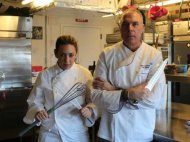Top Startup New York
 Madeline Stone/Business Insider
Madeline Stone/Business Insider
Stack Exchange chefs Phil Sireci and Shanna Sobel wield their tools.
Lots of startups have amazing perks. But how many have experienced chefs cooking them fantastic lunches every day?At Stack Exchange, a startup in New York's Financial District that hosts a network of question-and-answer sites, chefs Phil Sireci and Shanna Sobel serve up some pretty amazing meals.
From company favorite "breakfast for lunch" to gourmet duck l'orange, Sireci and Sobel make sure that no Stacker is ever left hungry or unsatisfied.
"The essence of what we do is hospitality. Our business is pleasing people, " Sireci said to Business Insider. "I rarely say no."
The pair met while working together at the East End Kitchen on New York City's Upper East Side. Sireci had spent time at hot spots Gramercy Tavern and Union Square Cafe, while Sobel had also worked at Colicchio & Sons and the Stanton Social.
When he was approached about the Stack Exchange job, Sireci was working in catering and considering opening his own place, yet he was tired of the restaurant world and its 100-hour work weeks.
Still, the decision to leave restaurant work for a tech startup was one that Sireci was hesitant to make, at least at first.
"It wasn't attractive at all. I've always been in restaurants. But when I came up and saw them eating lunch, you could see, it's nice and there's a sense of community, " Sireci said. "As a chef, what I want to do is cook my food and see people enjoy it. This is a much closer connection to that than the restaurant ever was. I get to watch them, and I know all of their names. I almost know all of their little quirks and what they like and what their allergies are. It's almost like cooking for my family every day, like a family of 100."
Sobel was also getting fed up with restaurants at the time Sireci approached her to join him at Stack Exchange.
"I loved working in restaurants. I liked to be challenged, the thrill and the challenge of what service was, " she said. "But as a woman, for me, it was really quite difficult to be taken seriously in the restaurant business and as a chef. Pastry chefs are not treated well in kitchens. So luckily when I met Phil he really flipped that for me."
After eight months of work in the Stack kitchen, they seem to have perfected their process. Sireci plans lunch for the day, while Sobel picks the dessert and helps out with lunch preparations.
But it hasn't all been easy. Their kitchen had to go through a strict health inspection process just like any other restaurant, and the office building's fire codes have prevented them from installing certain equipment, like a deep fryer, that would be typical in a more traditional kitchen.
Still, working as a chef in the Stack Exchange kitchen has given the two of them a huge amount of freedom to exercise their creativity and cook the things they want for the company's 100 or so employees.
"The good thing about this place is that it's not really lunch. We cook dinner that just happens to be at lunchtime, " Sireci said. "As a chef, I'd have a menu that's set. Then I would teach all my line cooks how to do that, and then I would go in and do my special for the day, and that's what would inspire me. I look at this as a special every day."
You might also like
#CPHFTW goes live - becomes more than a meetup — ArcticStartup
.. something that can benefit all startups, both big and small. -. This article is in collaboration with Øresund Startups, originally by Karsten Deppert and covers news about startups and events from the startup scene.



